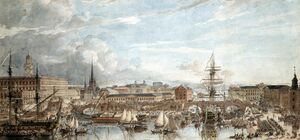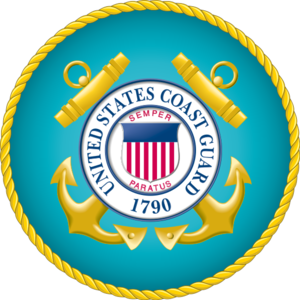Many thanks to our Patrons who cover ~2/3 of our hosting bill. Please join them if you can.
1790
Jump to navigation
Jump to search
1780 < 1781 < 1782 < 1783 < 1784 < 1785 < 1786 <1787 < 1788 < 1789 < 1790 > 1791 > 1792 > 1793 > 1794 > 1795 > 1796 > 1797 > 1798 > 1799 > 1800
 The Russo-Swedish War (1788–1790), which started with a Swedish false flag attack, is ended. The picture shows Swedish warships being prepared in Stockholm harbor. |
Contents
Events
- January 8 – United States President George Washington gives the first State of the Union address, in New York City.[1]
- January 11 – The 11 minor states of the Austrian Netherlands, which took part in the Brabant Revolution at the end of 1789, sign a Treaty of Union, creating the United States of Belgium. British Prime Minister William Pitt refuses to recognize the new confederation's independence.
- January 14 – U.S. Secretary of the Treasury Alexander Hamilton submits his proposed plan for payment of American debts, starting with $12,000,000 to pay the foreign debts of the confederation, followed by $40 million for domestic debts, and $21.5 million for the war debts of the states. The plan was narrowly approved 14-12 in the Senate and 34-28 in the House.
- February 1 – In New York City, the Supreme Court of the United States convenes for the first time.
- February 4 – Louis XVI of France declares to the National Assembly that he will maintain the constitutional laws.
- March 1 – The first United States Census is authorized; it is held later in the year.
- March 4 – France is divided into 83 départements, which cut across the former provinces, in an attempt to dislodge regional loyalties based on noble ownership of land.
- March 21 – Thomas Jefferson reports to President George Washington in New York, as the new United States Secretary of State.
- April 10 – The United States patent system is established.
- June 20 – Compromise of 1790: Thomas Jefferson, James Madison, and Alexander Hamilton come to an agreement: Madison agrees to not be "strenuous" in opposition for the assumption of state debts by the federal government; Hamilton agrees to support the capital site being above the Potomac.
- July – Louis XVI of France accepts a constitutional monarchy.
- July 10 — The U.S. House of Representatives votes, 32-29 to approve creating the District of Columbia from portions of Maryland and Virginia for the eventual seat of government and national capital.
- July 12 – French Revolution: The Civil Constitution of the Clergy is passed. This completes the destruction of the monastic orders, legislating out of existence all regular and secular chapters for either sex, abbacies and priorships.
- July 16 – U.S. President George Washington signs the Residence Act into law, establishing a site along the Potomac River as the District of Columbia and the future site of the capital of the United States. The move comes after the bill is narrowly approved on July 1 by the Senate, 14 to 12, and on July 9 by the House, 32 to 29.
- July 26 – Alexander Hamilton's Assumption Bill, giving effect to his First Report on the Public Credit, is passed in the United States Congress, allowing the federal government to assume the consolidated debts of the U.S. states.
- July 27 – The Convention of Reichenbach is signed between Prussia and Austria.
- July 31 – Inventor Samuel Hopkins becomes the first to be issued a U.S. patent (for an improved method of making potash).
- August 14 – The Treaty of Värälä ends the Russo-Swedish War.
- September 30 – Leopold II, Holy Roman Emperor starts to rule.
- November 24 – France's Constituent Assembly passes a law requiring all Roman Catholic priests to swear an oath of acceptance of the new French Constitution.[2]
- December 10 – The Hawkesbury and Nepean Wars against the inhabitants begin in New South Wales, Australia, as a result of deterioration in relations and increasing colonization.
- December 11 – Russo-Turkish War (1787–92): During Alexander Suvorov's storm of Izmail, 26,000 Turkish soldiers lose their lives.
- December 26 – Louis XVI of France gives his public assent to Civil Constitution of the Clergy during the French Revolution.
Event
| Event | Start | End | Description |
|---|---|---|---|
| French Revolution | 5 May 1789 | 9 November 1799 | Often cited event in world history that has an even more brutal side to it than is usually discussed. |
A New Group
| Group | Image |
|---|---|
| US/Coast Guard |  |
Deaths
| Title | Born | Died | Place of death | Summary |
|---|---|---|---|---|
| Giuseppe Santarelli | 1710 | 1790 | Clergy Castrato | |
| Benjamin Franklin | 17 January 1706 | 17 April 1790 | US Pennsylvania Philadelphia | Politician |
Many thanks to our Patrons who cover ~2/3 of our hosting bill. Please join them if you can.
References
- ↑ http://www.historyorb.com/events/date/1790
- ↑ Michel Vovelle, The Fall of the French Monarchy 1787-1792 (Cambridge University Press, 1984) p131